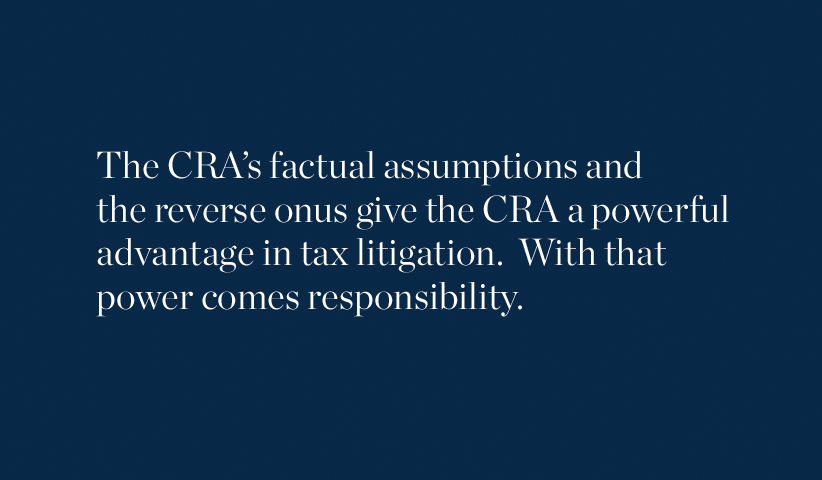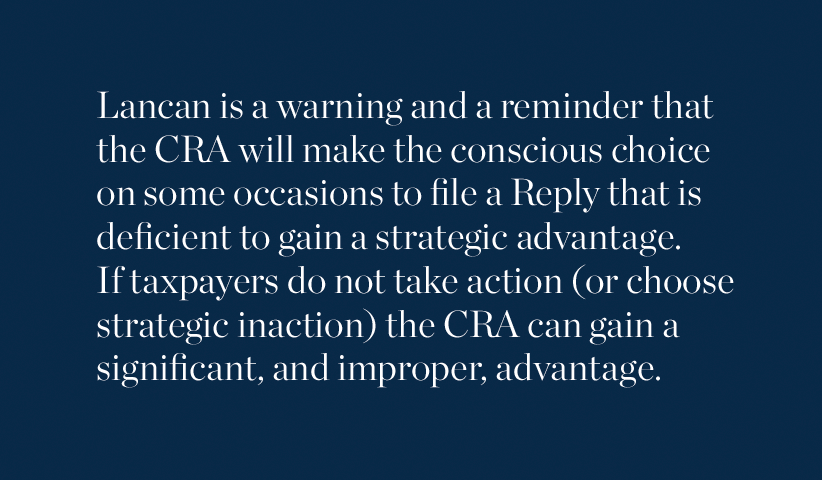
In Tax Court of Canada appeals, the pleadings are the most important documents that the parties file. The Appellant (taxpayer) is required to file a Notice of Appeal, and the Respondent Minister of National Revenue (the “CRA”) is required to file a Reply to the Notice of Appeal. The pleadings define the relevant facts, reasons and issues in dispute. In addition, pleadings establish the production of relevant documents and limit the scope of examination for discoveries and the appeal. Simply put, the pleadings set the parameters to ensure a fair appeal.
The rules of pleadings require that the parties plead with specificity. The CRA has a duty to disclose in the Reply the precise findings of fact and rulings of law that underlie the tax dispute. The Reply must list the facts that are admitted, denied, the material assumptions and the CRA’s reasons on which it intends to rely in the Tax Court. The CRA’s factual assumptions are, in most cases, taken as true and the taxpayer will bear the burden to demolish these assumptions.
The Reply must be truthful, clear and precise. The Reply should be straightforward, plainly understandable, and not rely on any inferences. If the Reply is deficient, the taxpayer cannot know the exact case and the burden that the taxpayer must meet to succeed in the Tax Court appeal. Moreover, the CRA can manipulate the parameters of examinations for discovery, change its position and the scope of the appeal to gain an improper advantage. The CRA’s factual assumptions and the reverse onus give the CRA a powerful advantage in tax litigation. With that power comes responsibility.

It is imperative that taxpayers review the Reply in detail and with a critical eye. The Tax Court of Canada Rules contain two essential tools to deal with a Reply that is deficient:
- Rule 52 provides that a party can demand particulars to compel that the opposing party to provide details of an allegation. A Demand for Particulars is a valuable tool to reveal the CRA’s case, prevent surprise, and limit the issues. A Demand for Particulars is a cost-effective and prudent way to obtain the desired result and avoid more aggressive measures. If the CRA does not provide answers to a Demand for Particulars within 30 days, the party can ask that the Tax Court order the CRA to comply.
- Rule 53 provides that a party can file a motion in the Tax Court to strike out all or part of a pleading if it is deficient. Rule 53 motions are appropriate when the pleading is scandalous, frivolous or vexatious, are an abuse of process or it is plain and obvious the pleading has no reasonable prospect of success.
Our firm’s practice is to review the Reply on receipt, highlight any admissions, denials or vague assumptions of fact, along with the government’s legal position. In addition, we note any inconsistent assumptions that may cancel each other and shift the onus of proof. We markup the Reply, make notes and brainstorm how best to attack the CRA’s position.
In most cases, our firm will file a Demand for Particulars to narrow the CRA’s position and ensure clarity. If the Reply is sloppy or omits crucial findings, we may choose to wait and use the deficient Reply to attack the CRA’s position at the hearing of the appeal. In appropriate cases, if the CRA does not provide an appropriate response to the Demand for Particulars, we will initiate a Rule 53 motion to strike the Reply in whole or in part.
Lancan Investments Inc. v. Her Majesty the Queen
In Lancan Investments Inc. v. Her Majesty the Queen, 2015 TCC 27 (“Lancan“), the taxpayer filed a Demand for Particulars, but the CRA refused to provide sufficient answers. In these circumstances, the taxpayer brought a motion in the Tax Court under Rule 53 to strike portions of the Reply and, in the alternative, under Rule 52 to compel the CRA to answer its Demand for Particulars. The taxpayer’s position was that the Reply was vague and imprecise, and the CRA intentionally omitted material facts to expand the scope of examination for discovery and gain an improper advantage. In particular, the taxpayer argued that the CRA violated the rules in an attempt to conduct a “fishing expedition” at discovery.
The Honourable Justice Pizzitelli reviewed the Reply and confirmed that the taxpayer was correct to insist that the Tax Court strike the offending portions or require that the government fully particularize all facts. Justice Pizzitelli identified the tactic and the implications of improper pleadings, at paragraph 27 of the Reasons for Order, as follows:
“The (CRA) argued that since its pleading was clear and ambiguous, then it in fact “had a licence to fish.”In light of the above, it is clear to me that the parameters of the “fishing licence” are and must be set within the issues properly pleaded with their material facts. In other words, with sufficient particulars that clearly and precisely define the issues. It is for this reason that “They tie the hands of the party, and he cannot without leave go into any matters not included”, as stated by Campbell J. in Mastronardi above at paragraph 10. I strongly agree with the (the taxpayer’s) position on this matter as the Residency Allegation is too wide and imprecise, capable of different meanings and of encompassing different factual elements necessary to meet possibly different legal tests. To let it stand without particulars would be to declare “open season” rather than set parameters of a licence.”
The Importance of Pleadings
Our experience, along with the recent caselaw, reveals that deficient pleadings are on the rise. We hope that the recent caselaw that punishes attempts to gain an improper advantage will cause the CRA to plead truthfully, clearly and precisely. At the very least, we hope that the caselaw will cause the CRA to supply appropriate and complete answers when faced with a Demand for Particulars.
Lancan is a warning and a reminder that the CRA will make the conscious choice on some occasions to file a Reply that is deficient to gain a strategic advantage. If taxpayers do not take action (or choose strategic inaction) the CRA can gain a significant, and improper, advantage. However, a deficient Reply will also provide skillful taxpayers and counsel with the opportunity to attack the violation and turn it into an advantage.

.jpg?width=120&name=Counter%20Tax%20Litigators%20Logo%20Stacked%20(MidnightBlue%20on%20White).jpg)




.png?width=499&height=299&name=CRA%20Disputes_Management_Board_First_Conversation%20(Sphere%201%20Purple).png)


.png?width=400&height=400&name=CT-How_Can_We_Help-22_july_NewGraphic_b(small).png)